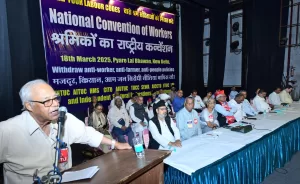The ancient Greeks used two words to describe time: chronos and kairos. Chronos depicted linear time that could be broken down into quantitative units and measured – days, weeks, months, and years. (Chronology and chronometer, incidentally, are both derived from Chronos.) Kairos, on the other hand, denoted ‘deep time’, and those living in it were so profoundly invested in matters of genuine and deep importance, that the passage of linear time became almost irrelevant for them.
The farmers camped on the borders of Delhi are good examples of those who are living in kairos, for when chronos-driven city-dwellers ask them questions like, “How long will you stay on protest?” they receive answers like, “Till such a time as the three farm laws are repealed and we get MSP (minimum support price) for all our crops.”
“Yes, but you have already been here for eight months! How much longer will you continue your protest??”
And the kairos-dwellers simply reply, “As long as we need to.”
The farmers have grasped the existential danger India is in and are willing to stay the course as long as they have to, regardless of the cost to them. They have understood that democracy – the very heart and soul of India – has never been under greater threat than it is today under Narendra Modi’s government.
It has been inspiring to see not just their remarkable patience, but also the transformative effect of their kairos-inspired courage on others. For example, Nirvair Malhi, the 19-year-old high school graduate from Jalandhar who came to the Tikri border with the intention of visiting the protest for exactly a day, but who has ended up staying there for the last seven months!
Nirvair comes from an upper middle-class family in Punjab. In his own words, he never cared for much more than his own comfort. All that changed when the protests began. He said, “I started finding it difficult to sleep at night, thinking about those old farmers on Delhi’s borders.” He tried convincing his parents to let him go to Delhi, but they would have none of it!
Finally, on new year’s day, when an opportunity presented itself to visit Delhi and distribute food items to the farmers, he told his parents, “I’m going.” And left. That night, after visiting the protest at Tikri, he stayed at the Radisson Hotel in Dwarka. Somehow, it felt wrong. How could he sleep in a warm bed while tens of thousands of farmers were sleeping out of the roads in the freezing Delhi cold? Two days later, he went back to Tikri Border, found the tent with the people running the farmers’ newspaper, ‘Trolley Times’, and asked if he could please stay with them.
“They didn’t know me,” he says, ”but they welcomed me with open arms, and made a place for me in their tent and in their lives. I felt I had come home.”
Amongst his many other duties, Nirvair also runs the Shaheed Bhagat Singh library at Tikri. His day begins at 5 am.
“We have to walk a couple of kilometres to get drinking water,” he says, “but trust me, even to get that on some days is a feat! We also have to get firewood to boil water for a bath, because the underground water here really isn’t even fit for bathing, much less drinking.”
I ask him how he is coping with the summer heat, and he laughs.
”It’s hot as hell, man, and the mosquitos keep me awake a lot, but you know what? I am happy here, because for the first time in my life I have started to understand what is truly important and what is not. Back home in Jalandhar, I would have bought myself a new phone cover on Amazon for Rs 1,000 without thinking twice. After coming here, I have realised just how far Rs 1,000 can go and how many people it can feed.”
He pauses and says, “I know of a farmer who died by suicide because he didn’t have Rs 12,000 to pay off his debts. How do you think the child of that farmer would feel if he saw me spending Rs 12,000 on a meal with my friends at a fancy restaurant? We know the price of everything and the value of nothing. Here, I am finally beginning to see just how privileged I have been, and how little so many have.”
Nirvair’s insights are deep for his age. Faulting the school system for many of the problems India’s youth face, he says, “Our schools have turned us into robots. We are taught to obey and conform from a very young age. And so, of course, we don’t question the larger system either which makes the rich richer and pushes the poor deeper into poverty.”
“My generation has a problem. We don’t fight for ourselves and we don’t fight for others. That is because we don’t value ourselves, and we don’t value ourselves because we see ourselves as dispensable cogs in a machine. If we don’t value ourselves, how will we ever learn to value and care for others?”
He also laughs a bit at what he calls “protest tourism”.
“You don’t become an activist by visiting a protest and taking selfies. Activism is not a photo-op. Activists are forged in the fires of hardship and testing. It’s tempting to post photos of oneself and get some adulation from one’s friends but I find it best not to, and instead just focus on what needs to be done, and learn what I need to, here. My friends ask me, ‘Haven’t you done enough already? When are you coming home?’ They don’t understand it and I can’t explain it to them.”
Nirvair may have lost a few friends, but he has made many more at Tikri. “Friends without an agenda,” he calls them, “real friends who are like brothers and sisters that you can count on.” Nirvair also says he has found a mentor in Sudarshan Natt from Mansa, a senior farmer union leader who has spent most of his life fighting for the rights of Dalits and farm labourers in Punjab. “We have long conversations, late into the night and discuss politics and society and literature. I have learnt so much from him.”
When the deadly second wave of COVID-19 hit Delhi, Nirvair and the ‘Trolley Times’ team arranged for freshly cooked food to be delivered to hundreds of families all over the city who were not able to cook for themselves.
“My goal in life is not to immigrate to Canada like so many others. It is to do what I can to build an India where the marginalised are no longer so. This protest will end one day and we will all go back, but I will keep those whom I have met here in my heart forever.”
Nirvair is living in challenging circumstances and has his fair share of bad days, but there is no denying that he is living a life of meaning and purpose. Like thousands of others here at Tikri, he, too, has found kairos.
(Rohit Kumar is an educator with a background in positive psychology and psychometrics. Courtesy: The Wire.)




